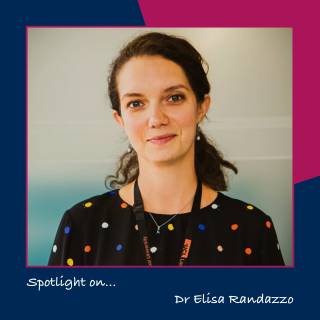Dr Elisa Randazzo is a Lecturer (Teaching) in Politics, Social Change and Innovation. She is also the Director of Equality, Diversity and Inclusion at UCL STEaPP.
 How long have you been at STEaPP? What does your role involve?
How long have you been at STEaPP? What does your role involve?

I joined STEaPP in January 2022 as a Lecturer (Teaching) in Politics, Social Change and Innovation. As part of my role I teach Undergraduate and Postgraduate students. I’m a supervisor to one PhD student, and organise, oversee, and run an interdisciplinary programme called 'How to Change the World' to over a thousand students in the Faculty of Engineering Sciences.
Beyond my teaching responsibilities, I am also Director of Equality, Diversity and Inclusion (EDI) in the department, and conduct scholarly research in the area of political agency in conflict and climate-change affected areas.
What drew you to STEaPP and UCL?
Most people would be familiar with UCL’s reputation as one of the leading institutions for both teaching and research excellence. The opportunity to contribute to both, and to be part to such a global-oriented community of students and researchers was really a once-in-a-lifetime one for me. Coming from the social sciences/humanities, joining this department was truly an exciting prospect. I couldn’t wait to join an interdisciplinary group of researchers and educators working on the most challenging and complex problems of our time, and to do so in open and honest intellectual conversation with each other. So far it has been an incredibly rewarding experience. As a plus, I have fantastic colleagues!
How does your research feed into your teaching (and vice versa)?
My initial research focus was on local ownership and bottom up approaches in the context of peacebuilding efforts. Empirically, I focused initially on post-conflict Kosovo, where I conducted field work for several years. Teaching International Relations and Security studies allowed me to bring in the experiences of people affected by protracted peace and state-building interventions whose voices and experiences are often side-tracked in formal settlements. Since then, my research has engaged with political agency in contexts of uncertainty, including climate-related disasters. The theoretical underpinnings of this research, and particularly insights from Critical Indigenous Studies have allowed me to bring into my classes a wider consideration for both the positionality of conducting research, and also the need to challenge uncritical assumptions about which (and whose) knowledge matters. Over the course of several years, encountering students coming from a wide variety of backgrounds has also enabled me to reflect on how we may approach knowledge production, and how we disseminate it (or spotlight it) in the context of higher education, as well as how different experiences mediate how research is conducted, produced, shared and communicated.
What inspires you?
Critique. Not in the sense of criticising for the sake of it, but rather, the push to think about (and re-think) the established order of things, or the narratives that govern our worlds and our societies. Asking questions, not taking things for granted, unpacking assumptions, these are just some of the infinite possibilities that a critical predisposition can do. It is inspiring, productive, and genuinely rewarding.
What achievements are you most proud of?
In some ways I am proud of research that makes it out into the real world, either in book or article form, but for very different reasons. I may not particularly like all of them, but I’m proud of the process of generating an argument, especially when it involves collaboration with fantastic co-authors, or learning from the invaluable feedback of reviewers and editors.
I am also proud of what my students achieve. I see how differently they think about a subject after weeks of thinking, reading, discussing, and I’m proud of them for opening themselves up to questioning the world, to learning together, to discussing their doubts, and sharing their knowledge. I am occasionally also proud of the small part I can play in facilitating that.
Who influenced you?
There’s a long list here, of absolutely fantastic people in my life that have left a mark, be from my closest family, to my friends, and my collaborators. Professionally, my PhD supervisors have left a mark, in different ways. They taught me to stand my ground, defend my arguments, and ask questions, always, but also to listen, be receptive to feedback, be flexible. Along the way, I’ve also had fantastic colleagues that have influenced the way I approach my job, the way I do research, as well as the kind of colleague I can be.
If you could give one piece of advice to your teenage self, what would it be?
Don’t be afraid to ask questions, it doesn’t make you a trouble maker! Listen more to the people around you and, if possible, listen better.
What piece of advice would you like to give to a student?
If you’re struggling, speak up. Learning should not be a solitary experience.
What three words would you use to describe STEaPP?
Dynamic. Critical. Innovative
 Close
Close

